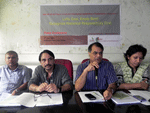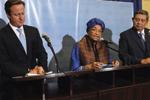Social Watch News
Published on Wed, 2013-06-05 00:00
The much awaited High-Level Panel (HLP) Report on the Post-2015 development agenda is deeply disappointing for LDC civil society. While setting the ending of extreme poverty as a core objective, and an aspiration to ensure every person achieves a basic standard of well-being, it ignores existing agreements that focus particularly on the world’s poorest and most marginalised LDCs. The HLP Report ironically gives no “special attention” to the LDCs, as called for in previously agreed development efforts. It is even regressive in the spirit of global partnership, |
Published on Tue, 2013-06-04 21:04
[Dhaka, Tuesday, 4 June 2013] Civil society right groups network EquityBD and VOICE in a press conference held at the city’s national press club criticized United Nation High Level Panel (UN HLP) report on post 2015 agenda terming it “as lofty goal and empty bowl” and said that the report is in fact a far short in transforming economies. The UN HLP report has just published on 30th June 2013 in New York. The UN HLP was co chaired by UK Prime minister Davide Cameron, Indonesian President Dr. Susilo Bambang and Liberian President Alen Johnson Sirlef. Moderated by Rezaul Karim Chowdhury, chief coordinator of Equitybd, the position paper was read out by Ahmed Swapan Mahmud, executive director of Voice. |
| Source: . Published on Sun, 2013-06-02 00:00 |
| Source: . Published on Fri, 2013-05-31 22:02 |
Published on Fri, 2013-05-31 13:44
(Montevideo, 31 May 2013) Social Watch, a network of civil society organizations in over 80 countries that monitor their governments compliance with international commitments, expressed deep disappointment with the suggestions of new development goals to replace the MDGs proposed today to the United Nations by a High Level Panel. The document is titled “A New Global Partnership” and the panel claims that, in preparing it, “we heard voices (...) from over 5000 civil society organizations working in about 120 countries” and “we also consulted the chief executive officers of 250 companies in 30 countries, with annual revenues exceeding $8 trillion”. |
| Source: . Published on Fri, 2013-05-31 00:00 |
| Source: . Published on Fri, 2013-05-31 00:00 |
| Source: . Published on Fri, 2013-05-31 00:00 |
| Source: . Published on Fri, 2013-05-31 00:00 |
|
Source: . Published on Fri, 2013-05-31 00:00
» |
SUSCRIBE TO OUR NEWSLETTER











